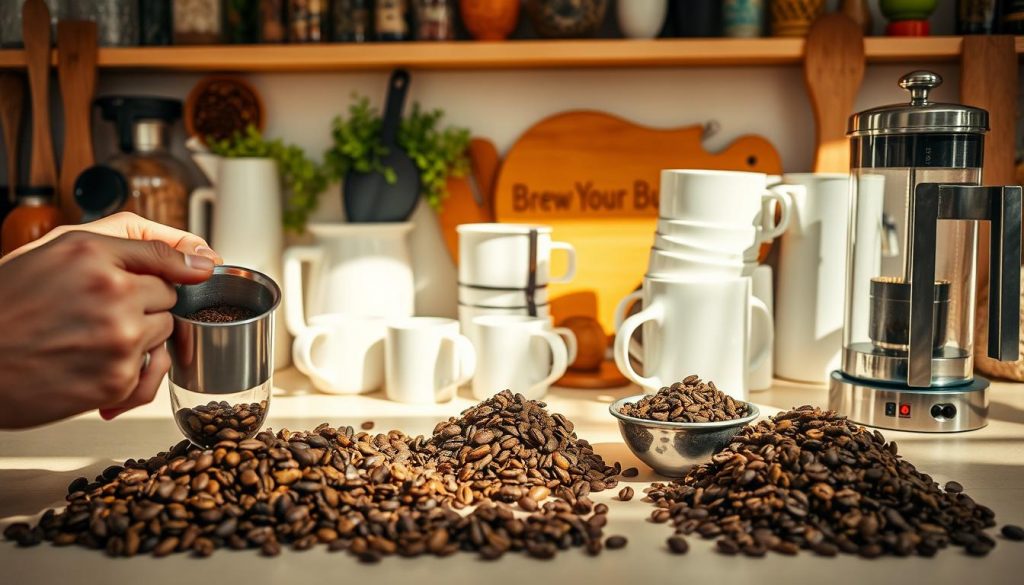A Comparative Guide
Coffee and tea are among the most loved drinks globally. Black tea is the most consumed, making up about 78% of tea worldwide.
In the U.S. and globally, brewed coffee and espresso are favorites. Both offer health benefits from plant compounds and antioxidants, but differ in their effects.
Drinking both in moderation can lower the risk of type 2 diabetes and some cancers.
It may also lead to a longer life, studies show. The health benefits come from compounds that fight inflammation and oxidative stress.
Yet, whether coffee or tea is healthier depends on your goals and how you make them.
The Mayo Clinic and the U.S. Food and Drug Administration suggest a daily caffeine limit of about 400 mg for adults.
The caffeine in coffee and tea changes based on brewing method and serving size.
This article aims to provide balanced information on the benefits and risks of both.
Key Takeaways
- Coffee and black tea both supply antioxidants and plant compounds that support health.
- Population studies show links between moderate consumption and lower disease risk.
- Caffeine limits for most adults are about 400 mg/day; amounts vary by brew and serving.
- Which is healthier depends on personal goals, sensitivity, and preparation methods.
- This guide compares coffee vs tea nutrition and practical tips to maximize benefits.
Overview of coffee and tea consumption and health-promoting compounds
Coffee and tea are among the most popular drinks globally. You can find them in U.S. cafés, kitchens, and vending machines.
They are a big source of dietary polyphenols for many.
Global and U.S. popularity of coffee and tea
Black tea is the top choice for 78% of global tea production.
This explains its wide use in Asia, Africa, and Europe. In the U.S., coffee is a daily favorite for millions.
Tea, both black and green, is popular for those looking for less caffeine.
Primary bioactive compounds in coffee and tea
Coffee contains chlorogenic acid, other phenolic acids, and antioxidants. Green tea is packed with catechins like EGCG and flavonols like quercetin.
Black tea has theaflavins and thearubigins, formed during oxidation.
How coffee and tea contribute to a healthy diet
Both drinks add antioxidants and plant compounds that may protect health.
The amount of caffeine varies with the type of bean or leaf, processing, and brewing.
Mixing coffee and tea can increase the variety of bioactive compounds you consume.
| Feature | Coffee | Green Tea | Black Tea |
|---|---|---|---|
| Dominant bioactives | Chlorogenic acid, phenolic acids | Catechins, EGCG, flavonols | Theaflavins, thearubigins, oxidized catechins |
| Typical role in diet | Daily stimulant, polyphenol source | Antioxidant-rich, lower caffeine option | Widespread global staple, antioxidant provider |
| Caffeine variability | High variability by roast and brew | Moderate, depends on steeping time | Moderate, influenced by blend and brew |
| Contributes to | coffee and tea consumption benefits; coffee and tea health effects | coffee and tea consumption benefits; coffee and tea health effects | coffee and tea consumption benefits; coffee versus tea health benefits |
coffee versus tea health benefits
Both coffee and tea have compounds that support health. They contain antioxidants and polyphenols.
Studies show they may lower risks for heart disease, some cancers, and more.
Studies show drinking coffee or tea can lower death rates. Both have molecules that fight inflammation and stress.
This is why they may reduce heart disease and cancer risks.
Both tea and coffee can improve metabolic health. They may lower type 2 diabetes risk and improve insulin sensitivity.
These benefits are seen in many groups.
Differing clinical outcomes and population studies
Coffee and tea don’t have the same effects on all health issues. Coffee is linked to lower Parkinson’s disease and liver disease risks.
Tea, on the other hand, may reduce heart disease and stroke risks.
The amount you drink matters. High black tea intake can lower stroke risk by 21%.
Drinking 5+ cups of coffee daily may lower stroke risk in women by 23%.
How combined consumption influences mortality and disease risk
New studies look at drinking both tea and coffee together. A 2023 study found this mix lowers cancer death risk.
It also shows lower heart disease mortality in some groups.
In people with type 2 diabetes, drinking more green tea and coffee can lower death risk.
This suggests that drinking both can be beneficial. Research continues to explore how mixing them affects disease risks.
| Outcome | Coffee (typical associations) | Tea (typical associations) | Combined patterns |
|---|---|---|---|
| All-cause mortality | Lower risk with moderate intake in many cohorts | Lower risk with regular consumption, varies by type | Mixed intake often shows additive reductions |
| Type 2 diabetes | Consistent inverse association | Inverse association, strong for green tea | Higher combined intake linked to lower mortality in diabetics |
| Stroke and heart disease | Lower stroke risk in some studies, dose-dependent | Lower coronary artery disease and stroke with regular intake | Certain mixes tied to reduced heart disease mortality |
| Liver and neurodegenerative disease | Lower risk of liver disease and Parkinson’s | Limited evidence for Parkinson’s protection | Combined effects under study; coffee drives liver benefits |
| Cancer outcomes | Some cancers show reduced risk with coffee | Tea linked to lower risk for select cancers in some cohorts | Specific combinations linked to up to 21% lower cancer death |
Caffeine content comparison and safety recommendations
Knowing how much caffeine you drink is key. A comparison of coffee and tea helps you choose the right amount for you.
This is based on your tolerance and goals.
Typical caffeine amounts per 8-ounce serving
Coffee usually has the most caffeine per 8-ounce cup. It has about 95 mg. Black tea has around 47 mg, while green tea has 29–30 mg.
These amounts come from lab and clinical reports.
Safe daily limits and special populations
Most adults can handle up to 400 mg of caffeine daily. Pregnant people should limit it to 200 mg.
Children and sensitive people may need even less.
Symptoms like jitteriness and trouble sleeping can happen at lower doses. This is true for some people.
How preparation, serving size, and product type change caffeine levels
Caffeine levels change with the type of bean or leaf, roast level, and steeping time. Longer brewing and hotter water extract more caffeine.
Espresso has a lot of caffeine per ounce.
Instant products and decaf differ in processing. Energy drinks and some sodas add extra caffeine.
This increases your total caffeine intake.
| Item | Typical caffeine per 8-oz | Notes |
|---|---|---|
| Brewed coffee | ~95 mg | Strong brew and dark roasts alter taste more than caffeine; larger mugs increase dose |
| Espresso (1 oz shot) | ~63 mg per shot | Smaller volume but concentrated; multiple shots raise total quickly |
| Black tea | ~47 mg | Steep time and leaf type affect levels; robust flavor often masks lower caffeine |
| Green tea | ~29 mg | Lower caffeine and contains L-theanine, which can smooth alertness |
| Decaffeinated coffee | ~2–5 mg | Not caffeine-free; trace amounts remain after processing |
| Energy drinks / sodas | Varies widely | Read labels; combined use with coffee raises total quickly |
When choosing between coffee and tea, think about caffeine and other compounds. The balance you pick affects your health benefits every day.
Antioxidants and polyphenols: coffee vs tea nutrition
Coffee and tea have similar protective compounds but differ in type and amount.
Knowing these differences helps you pick drinks that help lower heart and cancer risks.
Major antioxidants in coffee: chlorogenic acid and flavonoids
Coffee is full of chlorogenic acid (CGA), which fights inflammation and protects cells.
The roast level and brewing method affect CGA levels. For many, brewed coffee is a key source of phenolic acids.
Flavonoids in coffee also protect blood vessels and cells, adding to its health benefits.
Major antioxidants in tea: catechins, EGCG, theaflavins, thearubigins
Tea has a unique mix of antioxidants. Green tea is rich in catechins, like EGCG, which is very active in lab tests.
Black tea gets its flavor and antioxidants from theaflavins and thearubigins, formed during oxidation.
How polyphenols contribute to cancer and heart disease protection
Polyphenols work in many ways. They reduce oxidative stress and help blood vessels relax.
They also prevent plaque buildup, which is good for heart health.
In lab tests, theaflavins and thearubigins slowed cancer cell growth. Chlorogenic acid was active against certain cancers in test-tube studies.
Human studies show mixed results, but regular coffee or tea drinking may lower cancer risks.
When comparing coffee and tea, remember both are full of antioxidants. The health benefits of coffee and tea are similar but come from different compounds.
This mix explains why studies show both similarities and differences in their health effects.
Available on our Teepublic Coffee Store
Energy, cognition, and mood effects of coffee and tea
Coffee and tea are quick ways to wake up and think clearly. Studies have shown caffeine’s impact on reaction time, memory, and endurance.
Drinking moderate amounts of caffeine can make you react faster and focus better.
Caffeine works fast. It boosts endurance by about 12% in exercise compared to a placebo. Drinks with 75–150 mg of caffeine improve reaction time and memory tasks.
This is why many athletes, students, and professionals drink coffee or strong tea before a challenge.
L-theanine in tea offers a different effect. It increases alpha brain waves for calm alertness.
When combined with caffeine, people feel more focused and less jittery. This mix helps with sustained attention and switching tasks smoothly.
Coffee boosts alertness by increasing dopamine and blocking adenosine receptors.
This leads to a quick energy boost and less fatigue. The effects of coffee are strongest right after drinking, making it great for short-term mental tasks.
Research also shows both drinks are good for brain health. Studies link regular, moderate consumption to lower dementia and Alzheimer’s disease rates.
They also show improved mood in drinkers.
But, the evidence isn’t the same for all outcomes. Some studies suggest tea is better for mood and depression, while others point to coffee for dementia prevention.
This difference comes from study design, population, and the many compounds in each drink.
Coffee and tea both offer unique benefits for the mind and mood.
The table below shows the main differences in short-term effects and long-term benefits.
Use it to choose the best drink for study sessions, workouts, or daily mood support.
| Aspect | Coffee | Tea (green/black) |
|---|---|---|
| Main active compounds | Caffeine, chlorogenic acids | Caffeine, L-theanine, catechins |
| Onset of alertness | Rapid peak, strong lift | Moderate lift, smoother when combined with L-theanine |
| Reaction time & short-term cognition | Clear improvements in trials with 75–150 mg | Improvements when caffeine present; added steadiness from L-theanine |
| Athletic performance | About 12% average endurance boost across studies | Benefits mainly from caffeine; smaller studies show modest gains |
| Mood and depression risk | Associated with lower depression in some cohorts | Consistent links to lower depressive symptoms in reviews and cohorts |
| Long-term cognitive protection | Moderate intake linked to lower dementia risk in several studies | Also associated with reduced dementia risk; mechanisms may differ |
| Best use case | Immediate alertness, workouts, focused bursts | Steady attention, calm focus, mood support |
Those interested in coffee versus tea will find both have benefits.
Ongoing research helps us understand who benefits most and how to balance immediate and long-term health.
Try different amounts and types to find what works best for you.
Metabolic health, weight management, and diabetes risk

Coffee and tea have compounds that affect metabolism and weight. Caffeine, chlorogenic acid in coffee, and tea polyphenols are key.
They influence calorie burn, fat oxidation, and glucose handling differently.
Caffeine and metabolic rate: calorie burn and fat oxidation
Caffeine can increase your metabolic rate by 3–13% for up to three hours. This means you might burn an extra 79–150 calories.
It also boosts fat oxidation during rest and exercise, aiding in weight control and athletic performance.
Chlorogenic acid, tea polyphenols, and effects on fat metabolism
Coffee’s chlorogenic acid may affect fat cell formation and metabolism. Studies in animals and some human trials support this.
It’s why coffee is sometimes linked to weight loss.
Tea polyphenols, like theaflavins and catechins, can reduce fat absorption. They do this by blocking pancreatic lipase in lab tests.
Animal studies show they can lower weight gain and improve blood lipids, favoring weight control.
More human trials are needed to confirm these effects.
Evidence linking coffee and tea to lower type 2 diabetes risk
Large studies show drinking coffee regularly may lower type 2 diabetes risk.
A review of nearly 193,500 people found a link between coffee and lower diabetes incidence.
Both coffee and tea have been shown to reduce diabetes risk in various studies.
For those with diabetes, drinking more coffee or tea before and after diagnosis may lower mortality.
These findings don’t prove cause and effect. Yet, they suggest a link between coffee and tea and better metabolic outcomes.
When choosing, think about your tolerance, added sugars, and total calories. Small changes in brewing and serving can impact your metabolic health.
Cardiovascular, liver, and other organ-specific effects
Many studies show a link between drinking habits and heart and liver health. The results vary based on the type of drink, how much is consumed, and the population studied.
Observational studies often find protective effects that highlight the importance of understanding these biological impacts.
Tea and coffee associations with stroke and heart disease risk
Research suggests both tea and coffee can lower the risk of stroke and heart disease.
A study of 74,961 people found drinking four or more cups of black tea daily could lower stroke risk by about 21%.
Another study of 34,670 women showed drinking five or more cups of coffee daily could lower stroke risk by about 23%.
Polyphenols in both tea and coffee improve blood vessel function and reduce inflammation.
This may explain the benefits seen in these studies.
Coffee and liver protection: fatty liver, fibrosis, and liver cancer evidence
Studies consistently show coffee is good for the liver. Reviews indicate coffee drinkers have lower risks of nonalcoholic fatty liver disease and liver fibrosis.
A pooled analysis found regular coffee drinkers had about a 23% lower risk of NAFLD and roughly 32% lower risk of fibrosis.
Antioxidants in coffee may reduce liver inflammation, limit fat buildup, and lower liver cancer risk.
Potential adverse effects (blood pressure, palpitations, iron absorption)
High caffeine intake can cause anxiety, palpitations, and headaches in some. Large amounts of coffee can have negative effects on the heart in certain individuals.
Black tea can reduce iron absorption, which may worsen anemia in those with iron deficiency.
Drink temperature is important. Drinks above 140°F (60°C) may increase esophageal cancer risk.
Pregnant women should limit caffeine to under 200 mg daily to reduce risks.
When comparing coffee and tea, consider both benefits and potential harms, along with your personal health risks.
Choosing between coffee and tea depends on your health goals and how you react to them.
Coffee is often better for liver health. Both drinks offer benefits for heart health due to their polyphenols and improved blood vessel function.
How to choose and consume coffee or tea for maximum benefits

Deciding between coffee and tea depends on what you want. Do you need a caffeine kick, steady focus, or something milder?
Your choice affects how you feel and what benefits you get.
Choose by purpose
For a quick caffeine boost, go for espresso or strong coffee. Green tea or matcha offer steady alertness and calmness.
If you prefer less caffeine, decaf coffee or herbal tea are good choices. Think about caffeine level, taste, and antioxidants when deciding.
Pick by nutrition and compounds
Green tea and matcha are packed with EGCG and antioxidants. Black tea has theaflavins and thearubigins.
Coffee has chlorogenic acids and flavonoids. Consider these when aiming for heart or liver health benefits.
Timing and portion control
Adults should limit caffeine to 400 mg daily. Pregnant people should aim for 200 mg.
Be mindful of serving sizes and avoid caffeine close to bedtime. These tips help manage caffeine intake.
Reduce harms
Avoid drinks hotter than 140°F (60°C) to prevent burns. Limit flavored syrups, added sugars, and high-calorie creamers. Also, space black tea from iron-rich meals to avoid iron absorption issues.
Consider medical interactions
Check with your doctor before drinking strong coffee or energy drinks. Certain conditions or medications may require decaf or herbal options. Always consult a healthcare professional when unsure.
Quick comparison
| Choice | Main benefit | Caffeine | Best use |
|---|---|---|---|
| Brewed coffee | Chlorogenic acids; broad antioxidant mix | Moderate to high per cup | Daily energy, metabolic support |
| Espresso | Concentrated caffeine; intense flavor | High per shot | Short, strong boost |
| Decaf coffee | Many coffee antioxidants with low caffeine | Low | Evening or caffeine-sensitive people |
| Green tea / Matcha | EGCG, L-theanine for calm focus | Low to moderate | Cognitive focus, antioxidant support |
| Black tea | Theaflavins/thearubigins for heart support | Moderate | Stable alertness, traditional choice |
| Herbal tea | No caffeine; soothing phytochemicals | None | Evening relaxation, caffeine-free option |
Use this guide to pick the best coffee or tea for you. Think about health benefits and nutrition together. Small, consistent habits lead to the best health outcomes.
Conclusion
Coffee and tea both have antioxidants that help fight chronic diseases. Coffee has more caffeine, which is good for the liver and metabolism.
Tea, on the other hand, has L-theanine and polyphenols that are better for the heart and mood.
When deciding between coffee and tea, remember the safe daily caffeine limit is 400 mg for most adults. Pregnant people should stick to less than 200 mg.
Your body’s sensitivity and health history are more important than which drink is better.
Enjoying coffee or tea, or both, can be part of a healthy diet. Choose what suits your needs and watch your portion sizes.
Avoid adding too much sugar or drinking it too hot.
If you have health concerns or are pregnant, talk to your doctor. They can help you make the best choice based on the latest research.
Available at our Teepublic Coffee Shop






